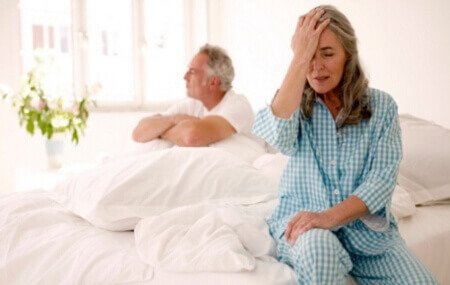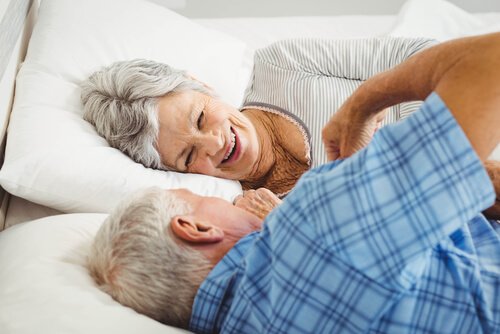Why and How Menopause Affects Sex Drive

Women have a lot more sex drive problems after menopause, as menopause seems to lower libido. Levels of estrogen drop after menopause, which can lead to reduced arousal and make sex more painful.
Menopausal and post-menopausal women might notice that they don’t get aroused as easily as before and that they’ve lost sensitivity. That can lead to less interest in sex. Not only that, but these lower estrogen levels can even affect blood flow to the vagina and reduce vaginal lubrication.
In this article, we’re going to talk about how menopause affects sexual desire in women and what you can do to boost your libido.
Menopause and libido
Menopause can negatively affect your relationship due to the physical and emotional changes that women undergo during this stage.
Some symptoms and side effects of menopause are anxiety, bladder control problems, low sex drive, depression, trouble sleeping, and weight gain, among others.

These symptoms can affect a woman’s quality of life, her relationship with her significant other, and even her self-esteem.
It’s important to clarify that not all post-menopausal women experience reduced libido and sexual desire. In fact, some women enjoy a boosted sexual drive. That could be partly due to the fact that post-menopausal women don’t have to worry about getting pregnant. Many post-menopausal women also usually have fewer responsibilities, which allows them to relax and enjoy sex and intimacy more.
Women who go through menopause experience decreased libido for many different reasons. According to a 2012 study from the Geisinger Medical Center’s Women’s Health Services in Danville, Pennsylvania, 68 to 86.5% of post-menopausal women suffer from sexual problems.
Why menopause affects sex drive
The decrease in estrogen levels can reduce blood flow to the vagina, which can thin the vaginal tissue and the tissue of the labia, making them less sensitive to sexual stimulation.
Decreased blood flow also affects vaginal lubrication and arousal in general. Consequently, some women don’t enjoy sex and have a hard time reaching orgasm. Sex can also be just plain uncomfortable or even painful for some women.
Hormone levels also fluctuate during pre-menopause and menopause. This can affect your mental health, which can also trigger a drop in libido.
Stress can also affect desire after menopause. Menopause often coincides with personal and work issues that make things complicated on a day-to-day basis. You might have issues with your teenagers, or you find yourself taking care of an elderly parent, or you have more responsibilities at work. There are plenty of potential stressors.
These hormonal changes might also cause irritability and increase the risk of depression, which makes it harder to deal with daily stressors.
According to an article published in the Journal of Women’s Health, women who experience significant menopausal side effects are more likely to have low libido as well. Some examples of those side effects are hot flashes, depression, anxiety, trouble sleeping, and fatigue.
Other factors that make women more likely to suffer from low sexual desire are chronic illness, smoking, and not getting enough exercise.
How to boost your sex drive after menopause
There are plenty of things women can do to increase their libido, such as medical treatments, lifestyle changes, or home remedies.
If you experience changes in your vaginal tissue, like thinning and dryness, one possible treatment is hormone therapy. One study found that women who had hormone therapy reported higher levels of sexual desire compared to the control group.

Unfortunately, estrogen therapy doesn’t guarantee you’ll get your sex drive back. An alternative option for treating dryness is using a water-based lubricant during sex.
Moreover, therapists specialized in sexual dysfunction can help you improve your sex drive. It’s important to note that both you and your partner should go see the therapist together, as this can improve your chances of seeing results.
Exercising more every day can also help reduce menopause-related symptoms. Eating a balanced and healthy diet can also improve your general sense of well-being and boost your libido.
In addition, there are many natural supplements to help boost your libido. However, it’s good to read the labels carefully and make sure that they don’t negatively interact with other medications or treatments you’re taking. You should also check if they have side effects or contraindications. Thus, it’s important to talk to your doctor before taking any medication or supplement.
Women have a lot more sex drive problems after menopause, as menopause seems to lower libido. Levels of estrogen drop after menopause, which can lead to reduced arousal and make sex more painful.
Menopausal and post-menopausal women might notice that they don’t get aroused as easily as before and that they’ve lost sensitivity. That can lead to less interest in sex. Not only that, but these lower estrogen levels can even affect blood flow to the vagina and reduce vaginal lubrication.
In this article, we’re going to talk about how menopause affects sexual desire in women and what you can do to boost your libido.
Menopause and libido
Menopause can negatively affect your relationship due to the physical and emotional changes that women undergo during this stage.
Some symptoms and side effects of menopause are anxiety, bladder control problems, low sex drive, depression, trouble sleeping, and weight gain, among others.

These symptoms can affect a woman’s quality of life, her relationship with her significant other, and even her self-esteem.
It’s important to clarify that not all post-menopausal women experience reduced libido and sexual desire. In fact, some women enjoy a boosted sexual drive. That could be partly due to the fact that post-menopausal women don’t have to worry about getting pregnant. Many post-menopausal women also usually have fewer responsibilities, which allows them to relax and enjoy sex and intimacy more.
Women who go through menopause experience decreased libido for many different reasons. According to a 2012 study from the Geisinger Medical Center’s Women’s Health Services in Danville, Pennsylvania, 68 to 86.5% of post-menopausal women suffer from sexual problems.
Why menopause affects sex drive
The decrease in estrogen levels can reduce blood flow to the vagina, which can thin the vaginal tissue and the tissue of the labia, making them less sensitive to sexual stimulation.
Decreased blood flow also affects vaginal lubrication and arousal in general. Consequently, some women don’t enjoy sex and have a hard time reaching orgasm. Sex can also be just plain uncomfortable or even painful for some women.
Hormone levels also fluctuate during pre-menopause and menopause. This can affect your mental health, which can also trigger a drop in libido.
Stress can also affect desire after menopause. Menopause often coincides with personal and work issues that make things complicated on a day-to-day basis. You might have issues with your teenagers, or you find yourself taking care of an elderly parent, or you have more responsibilities at work. There are plenty of potential stressors.
These hormonal changes might also cause irritability and increase the risk of depression, which makes it harder to deal with daily stressors.
According to an article published in the Journal of Women’s Health, women who experience significant menopausal side effects are more likely to have low libido as well. Some examples of those side effects are hot flashes, depression, anxiety, trouble sleeping, and fatigue.
Other factors that make women more likely to suffer from low sexual desire are chronic illness, smoking, and not getting enough exercise.
How to boost your sex drive after menopause
There are plenty of things women can do to increase their libido, such as medical treatments, lifestyle changes, or home remedies.
If you experience changes in your vaginal tissue, like thinning and dryness, one possible treatment is hormone therapy. One study found that women who had hormone therapy reported higher levels of sexual desire compared to the control group.

Unfortunately, estrogen therapy doesn’t guarantee you’ll get your sex drive back. An alternative option for treating dryness is using a water-based lubricant during sex.
Moreover, therapists specialized in sexual dysfunction can help you improve your sex drive. It’s important to note that both you and your partner should go see the therapist together, as this can improve your chances of seeing results.
Exercising more every day can also help reduce menopause-related symptoms. Eating a balanced and healthy diet can also improve your general sense of well-being and boost your libido.
In addition, there are many natural supplements to help boost your libido. However, it’s good to read the labels carefully and make sure that they don’t negatively interact with other medications or treatments you’re taking. You should also check if they have side effects or contraindications. Thus, it’s important to talk to your doctor before taking any medication or supplement.
This text is provided for informational purposes only and does not replace consultation with a professional. If in doubt, consult your specialist.







